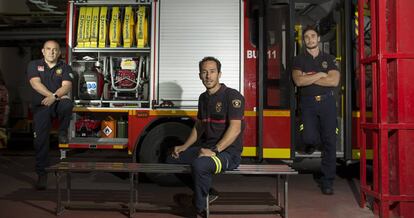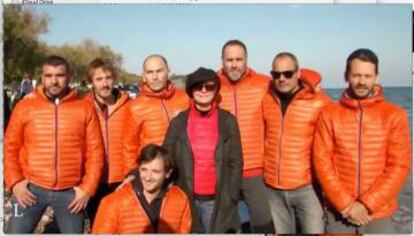Spanish firefighters on trial for rescuing refugees at sea
Greek authorities charge three men with attempted human trafficking despite months of cooperation


It was Aylan Kurdi who changed their lives. The three-year-old boy had fled the Syrian city of Kobane with his parents and older brother in a bid to reach Canada. His little body, dressed in a red t-shirt and shorts, was found washed up on the shore near Bodrum, Turkey after unsuccessfully trying to reach the Greek island of Kos on a dinghy on September 2, 2015.
The image of the drowned child, which made world news, suddenly illustrated the magnitude of the biggest refugee crisis experienced in Europe since World War II. It also moved three Spanish firefighters from Seville into action: Manuel Blanco, 47, Quique Rodríguez, 32, and Julio Latorre, 34, decided they had to do something to help all those people fleeing the war in Syria.
We performed the first rescue with no equipment or anything, just 10 minutes after stepping off the ferry
Quique Rodríguez, firefighter
“The image showed up on TV, I looked at the sofa and saw my own four-year-old son, and thought how desperate the parents must have been, seeing that nobody was helping them,” recalls Blanco.
That was the genesis for Proem-Aid (Professional Emergency Aid), an association founded in November soon after the story behind Aylan’s death emerged: only the father, Abdullah, had survived the sea crossing to Greece. The non-profit survives on donations. “We contribute our knowledge and our time; if people donate money we act, otherwise we don’t even have a headquarters – we meet at a colleague’s house – or an official telephone number or anything, just a website,” explains Blanco.
Day in court
For the three Spanish volunteers, the effects of their decision continue: on Monday they are due to stand trial inside a courtroom on the Greek island of Lesbos, accused of “attempting to smuggle people” into the European Union. They face up to 10 years in prison if found guilty.
“It is a very vague and imprecise charge,” says their lawyer, Haris Petsikos. The firefighters believe Greek authorities may be trying to set an example “in order to criminalize helping refugees.”

On the night of January 14, 2016 the three men were aboard a Danish vessel that went out to assist a boat that had reportedly capsized a few miles off the coast. The rescuers did not find the migrant boat, but on the way back they were intercepted by the Greek Coast Guard and accused of attempting to smuggle people into Greece.
“We were arrested by the same Coast Guard officers who used to call us for help, and who continued to call us afterwards,” notes Rodríguez. It had been their third shift in 15 months’ worth of rescue operations coordinated by the Seville association with participation from firefighters from all over Spain.
Paradoxically, their activities continued after they were charged. And what’s even more striking, the ensuing rescue operations were conducted in partnership with, and with the approval of, Greek authorities, who even gave the Spaniards a designated area to work in. The rescuers were also in constant touch with the Spanish consulate, as email exchanges provided by Blanco show.
Professional help
The Seville association notes that its volunteers are professionals trained to work in extreme conditions, and who are able to swim out to rescue drowning people in the treacherous Costa da Morte (Coast of Death) in Galicia, or withstand the freezing waters of Sierra de Gredos near Madrid.
Equipped with their emergency situation protocols, water rescue equipment and a vessel on loan from Spain’s Civil Protection agency, the Spanish firefighters made a name for themselves shortly after arriving in Lesbos.
The kids there didn’t cry. It’s as though they knew it was useless
Manuel Blanco, firefighter
When things got ugly at sea, the Greek Coast Guard would call them up “because we were among the few rescuers who did not hesitate to dive into the water even if the sea was rough,” they recall.
Even the US actress Susan Sarandon wanted to meet them when she visited the island in late December 2015.
All three say they would do it all over again despite getting in trouble with the law, and have plans to rescue people off the coast of Libya as soon as they “put together enough funding to be able to work with some guarantees.”
The three men admit that at first they didn’t realize the sheer scope of the task they would be facing. “I started to get an idea when I saw that the colleague who came to pick us at the airport up was still wearing his diving suit,” recalls Blanco.
“We performed the first rescue with no equipment or anything, just 10 minutes after stepping off the ferry,” explains Rodríguez.
One of the things that struck them the most was the silence of the children. “The kids there didn’t cry. It’s as though they knew it was useless,” says Blanco. “Everything gets amplified: the faces, the smells, the sounds, the night,” adds Latorre.
Now, these three men who wanted to stop more people from drowning on a 20-kilometer crossing that can be safely made on a ferry for €10 – but for which refugees pay around €1,000 to smugglers who provide rickety dinghies – are being tried for smuggling themselves.
English version by Susana Urra.
Tu suscripción se está usando en otro dispositivo
¿Quieres añadir otro usuario a tu suscripción?
Si continúas leyendo en este dispositivo, no se podrá leer en el otro.
FlechaTu suscripción se está usando en otro dispositivo y solo puedes acceder a EL PAÍS desde un dispositivo a la vez.
Si quieres compartir tu cuenta, cambia tu suscripción a la modalidad Premium, así podrás añadir otro usuario. Cada uno accederá con su propia cuenta de email, lo que os permitirá personalizar vuestra experiencia en EL PAÍS.
¿Tienes una suscripción de empresa? Accede aquí para contratar más cuentas.
En el caso de no saber quién está usando tu cuenta, te recomendamos cambiar tu contraseña aquí.
Si decides continuar compartiendo tu cuenta, este mensaje se mostrará en tu dispositivo y en el de la otra persona que está usando tu cuenta de forma indefinida, afectando a tu experiencia de lectura. Puedes consultar aquí los términos y condiciones de la suscripción digital.








































